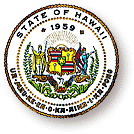Minimum wage
to rise, Bottle Bill
rules to ease
Those bills and one to tighten
campaign spending are not
on Gov. Lingle's veto list
Hawaii's minimum wage is going up; politicians will have a new, tougher campaign spending law to follow; and the controversial Bottle Bill will relax some of its rules.
 These bills passed by the 2005 Legislature will become law. Gov. Linda Lingle said she will not sign a bill that would raise the minimum wage in two steps from $6.25 to $7.25 an hour, but will allow it to become law without her signature.
These bills passed by the 2005 Legislature will become law. Gov. Linda Lingle said she will not sign a bill that would raise the minimum wage in two steps from $6.25 to $7.25 an hour, but will allow it to become law without her signature.
Lingle informed lawmakers yesterday that the measures will not be vetoed by her by the July 12 veto deadline. Bills that are not vetoed will automatically become law. Lingle already has vetoed some bills.
Lingle is considering vetoing 33 bills, including one that would raise the general excise tax to 4.5 percent to pay for a Honolulu mass transit system.
Lingle also is considering whether to veto a bill that would allow public workers to set up their own health insurance plans. Public employees are now required to join the state's health fund, but public school teachers have lobbied for three years to set up a plan they say would cost less and provide more coverage.
Lingle said the bill, HB 1608, would reverse past health fund reforms and negate the benefits of cost sharing under a single statewide system.
The governor said she also has to decide whether she will veto the remaining bills, including two others that deal with discrimination in housing and employment.
She said the measures were "vague and ambiguous."
Also Lingle said today she will make good on her threat to veto SB 1808, which would have stopped her administration's attempts to reform workers' compensation laws.
Lingle tried for two years to win legislative approval for her workers' comp law changes, but the Legislature refused, so she drafted the reforms this year as administrative rules that did not need legislative approval.
In response, the Legislature passed a bill stopping Lingle from implementing the rules.
"This is one of those handcuff bills that says, 'You can't make things better,'" Lingle said. "This issue was the No. 1 priority of the business community."
Legislative leaders have promised to override her veto.
"I'm very proud of the work we did this past session, so it's disappointing that the governor would veto these bills," Rep. Calvin Say, House speaker, said.
Senate President Robert Bunda said Lingle's action brings up a "separation of powers issue," with her setting policy without legislative concurrence, and "we feel very strongly about that."
In the minimum-wage bill, Lingle said she wanted the Legislature to include an increased tip credit for restaurant workers and also lower the unemployment tax threshold, but would not object to a minimum-wage increase. Another bill that she will either sign or allow to become law, SB 1747, limits campaign contributions from out-of-state donors and state contractors, and also increases public funding for Office of Hawaii Affairs candidates.
The new campaign spending law will prohibit both state and county contractors from giving money to any political party, committee, candidate or person for a political purpose. The law would also cover persons with a personal services contract, such as architects and engineers, who buy or sell property to the government.
The law would not limit contributions from unions.
Another bill that will become law, SB 212, will give up to $3 million in state money to pay for incentives for retailers to install reverse vending machines to take bottles and cans.
Potential major vetoes by LingleHere are some of the major bills Gov. Linda Lingle said she might veto and her reasons for rejecting the measures:
HB 1309: General Excise Tax Increase
HB 1450: Gender Identity in Employment
SB 1554: Research Corporation of the University of Hawaii Environmental Workforce
SB 1808: Workers' Compensation Law
|
www.hawaii.gov/gov/
E-mail to City Desk
[News] [Business] [Features] [Sports] [Editorial] [Do It Electric!]
[Classified Ads] [Search] [Subscribe] [Info] [Letter to Editor]
[Feedback]
